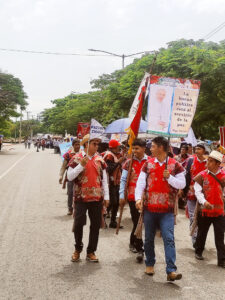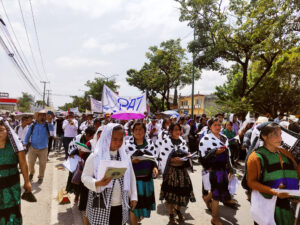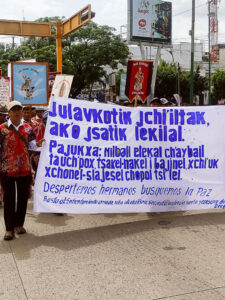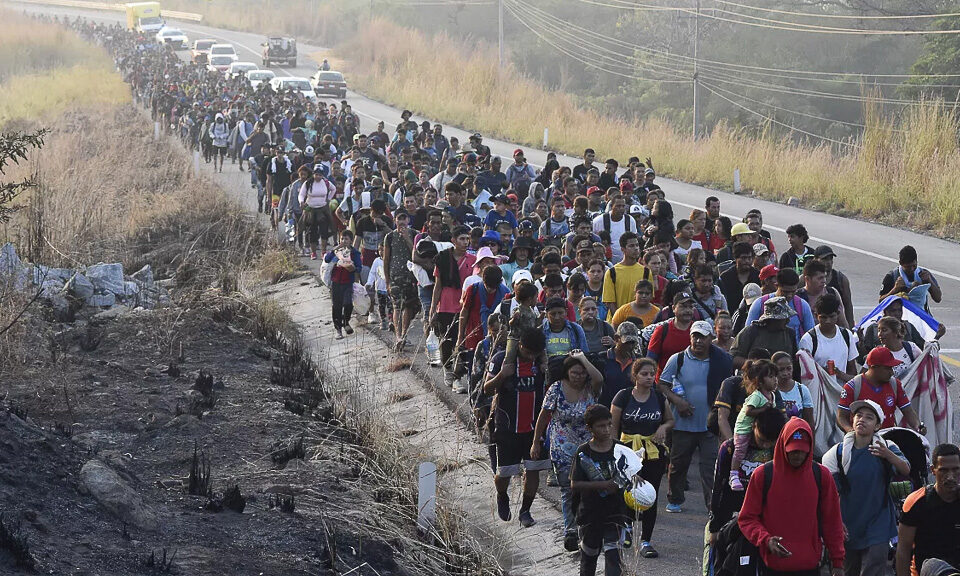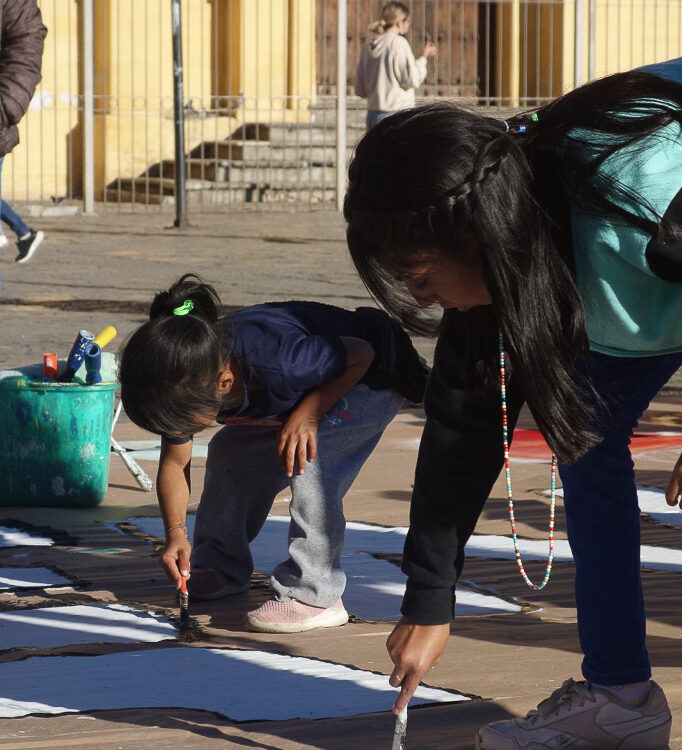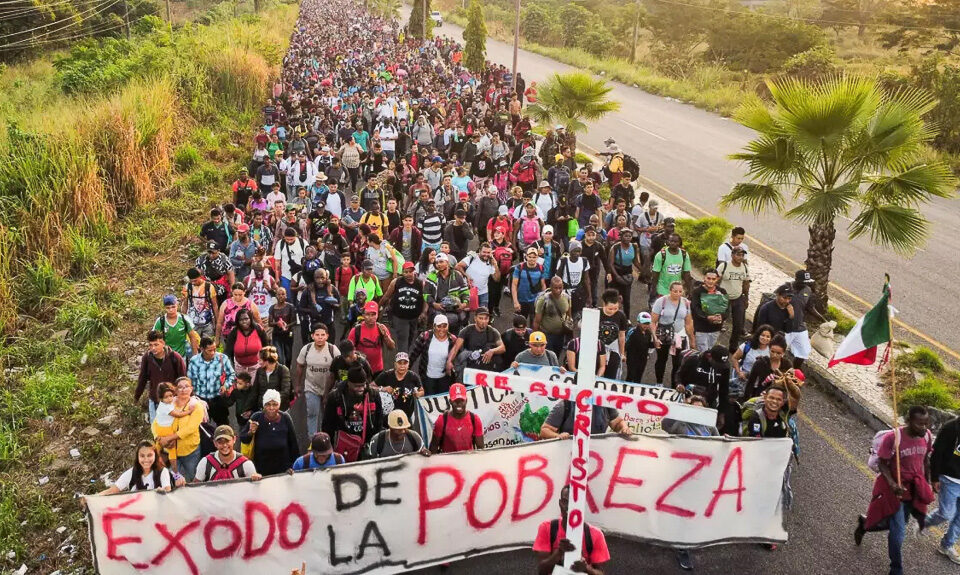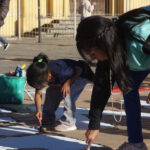
FOCUS: Violence against Children and Adolescents in Mexico. The Case of Chiapas
21/12/2024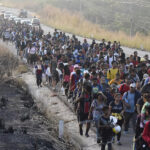
SIPAZ Activities (mid-August to mid-November 2024)
21/12/2024Jubilee Year, 100 Years of jTatik Samuel
N ovember 2023 marked a significant moment for the Diocese of San Cristobal, celebrating 100 years since the birth of Samuel Ruiz Garcia, a bishop who dedicated his life to defending the rights of indigenous peoples and who, to this day, is fondly remembered as jTatik Samuel. His legacy lives on, reminding us of the importance of social justice and human dignity.
November 3rd, the date of his birth, was the day chosen by the Diocese Day to begin the jubilee year, during which a series of events have been held that will culminate with the traditional pilgrimage of the Believing People on January 25th, 2025.
The jubilee year, entitled “jTatik Samuel, Traveler in the Heart of the Peoples. Memory and Horizons” framed, throughout 2024, the celebration of the 50th anniversary of the Indigenous Congress of 1974 and the 10th anniversary of the Mother Earth Congress of 2014. However, the violence that plagues the state in different regions was a constant during this period, also motivating a series of pilgrimages in several municipalities. Among these, the one on September 13th in the state capital Tuxtla Gutierrez stood out, which was particularly impressive due to the number of participants and the union of the three dioceses of Chiapas, something unprecedented.
As a further example of the criminal violence that prevails in Chiapas, on October 20th the celebrations of the jubilee year were overshadowed by the terrible murder of Father Marcelo Perez. An event that shocked and outraged entire communities, both in Chiapas and internationally. Following this unfortunate event, another mass and pilgrimage took place on November 3rd, which, in addition to commemorating the birth of Don Samuel, was marked by demands for justice for Father Marcelo. Although the event was expected to attract thousands of people, attendance far exceeded expectations, demonstrating once again that injustice and pain rekindle in the hearts of people the flame of long-awaited peace with justice.
In this context, the jubilee year has not only been a celebration of the life and work of jTatik Samuel, but also an opportunity to reflect on the progress and challenges that still persist in the defense of land and indigenous rights in Chiapas and throughout Mexico. The legacy of jTatik Samuel and, now, that of Father Marcelo invites us to continue working for a more just world, where the voice of each community is heard and respected.
50 Years of the Indigenous Congress
One of the most important milestones in jTatik Samuel’s career was the Indigenous Congress of 1974, held in the city of San Cristobal de Las Casas, Chiapas. This event brought together representatives of the Tseltal, Tsotsil, Tojolabal and Ch’ol indigenous peoples, under the motto “Equality in Justice.” For four days, the communities discussed the need for social change, working around four main axes: land, trade, education and health. jTatik Samuel played a fundamental role in the organization of this Congress, which became a space for dialogue and vindication for the indigenous peoples. It was a historic moment that laid the foundations for future social movements.
Fifty years after this unprecedented event, once again in San Cristobal de las Casas, and after a series of pre-congresses in different regions of Chiapas, more than 1,200 people from the Tsotsil, Tseltal, Tojolabal, Ch’ol, K’anjobal and mestizo communities met at the CIDECI facilities to commemorate the Congress of 1974, reflect on its legacy and analyze current problems in the territories. During three days of dialogue and analysis, the communities pointed out that “today, facing a new stage of colonization, where the way of life of our native peoples is attacked, breaking community relations and the wisdom of our cultures; we need to walk together as peoples, with our own face and with a single heart.” They also agreed to continue working in an organized manner in favor of life, care for Mother Earth and the search for peace with justice and dignity.
Mother Earth Congress
Since mid-2023, the Mother Earth Pastoral of the Diocese of San Cristobal began working for the commemoration of the 2014 Congress. Through pre-congresses held in the different pastoral areas, actions and reflections on the care for the Earth and the work carried out in the last ten years were shared. Finally, in June, the communities met in Naichen to celebrate a decade of walking together in the defense of Mother Earth.
At this meeting, they recalled the words of Pope Francis in his encyclical Laudato Si’, where he states: “Mother Earth, the beautiful mother who protects us and welcomes us, is crying out and crying out because of the damage we are doing to her, we have grown as if we were owners of the Earth, we have forgotten that we are part of the earth, but it is not ours.” Regarding this reflection, the communities added: “Let us look at the symptoms of our Mother Earth, because she is sick, but we must not only look at the symptoms, but also at the causes, the root of why Mother Earth is sick and dying, look at the causes and do something, some of these are over-exploitation and pollution. The power structures, the governments, the companies of this capitalist system that imposes a way of producing, imposes “Maya Trains”, imposes mega projects. These power structures are the ones that are contributing the most to Mother Earth becoming sick and dying.”
“We have also contributed, we have stripped our Mother Earth bare by cutting down trees, we have burned her, we have polluted her with the drains that go to the river and the garbage we throw away. We have also poisoned her when we work with chemicals, herbicides and we also poison ourselves,” they added.
During the meeting, the efforts that are being made in each area to protect and heal Mother Earth were shared. These initiatives include garbage collection, a ban on the use of disposable items at parties and religious celebrations, reforestation, a ban on logging, and the creation of agroecological projects, as well as reconnection with ancestral spirituality. Finally, they pledged to continue working as a community to defend and care for Mother Earth.
We are not afraid
“I am not afraid of death or jail, because the body can be imprisoned, but the fight for ideals never is,” said Father Marcelo in an interview with the media outlet Desinformemonos, words that he used to repeat in various spaces when he was questioned about the threats he received.
The death of Father Marcelo deeply upset the hearts of the people. Pain, rage, helplessness, indignation and fear were some of the feelings that invaded thousands upon hearing the news of his murder. However, when remembering his words, his presence and the way he walked with the people, these feelings were transformed into seeds of unity and strength to continue the struggle. “He moved our hearts and those of our community, it was an impulse to wake up. He leaves us the task of continuing to build peace, justice and truth,” members of the Believing People stated.
The struggle for the defense of the land and in favor of peace and justice has never been free of challenges and tragedies. His death was a painful reminder of the risks faced by those who defend justice and equality.
Father Marcelo’s work focused on the search for peace, mediation and reconciliation between peoples, as well as the defense of Mother Earth. As a Tsotsil indigenous person, he knew firsthand the pain of those he accompanied until his last days. “I firmly believe that true peace is achieved through dialogue, not by shooting, killing or beating. The one who does that has lost his mind. By recovering reason, peace is possible,” he used to say. It is essential to remember that the struggle for social justice has been and continues to be a path that requires commitment and courage. jTatik Samuel and Father Marcelo are living examples of this dedication. Through their journey, their struggle and their love for the people and the construction of a peace with justice, they taught us how faith and action can come together to transform realities and build a more hopeful future.
“We are not afraid; we are not afraid. We will never be afraid again. “I want my country to be happy with love and freedom.”
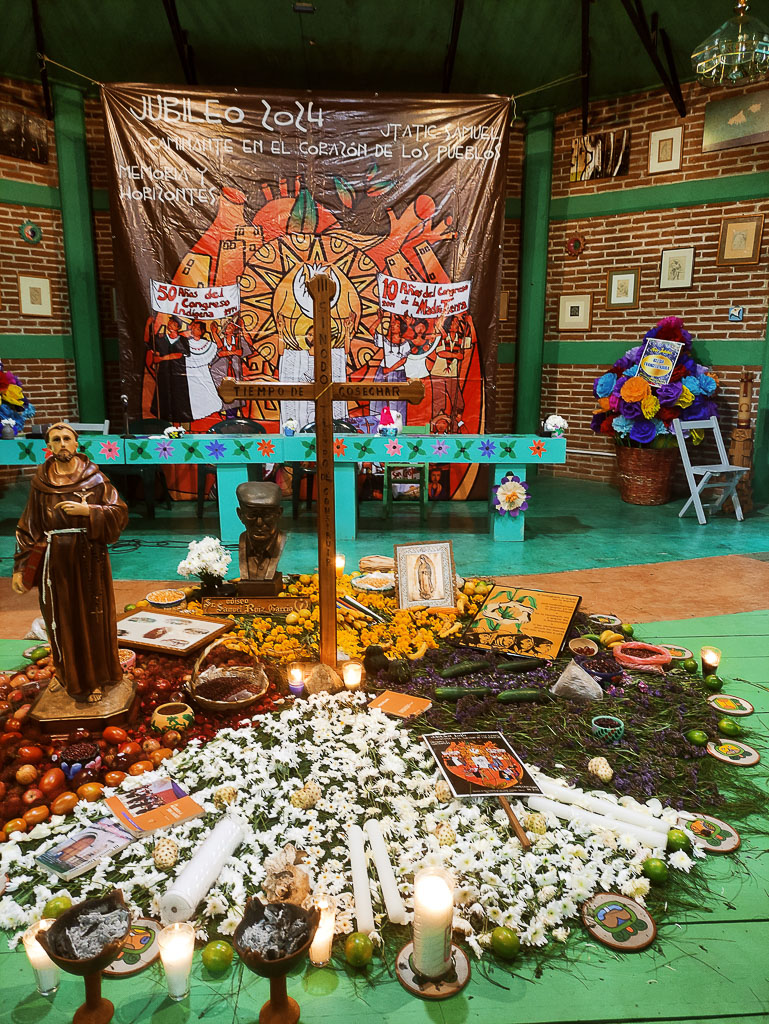
Diocesan Congress in the framework of the Jubilee Year, San Cristobal de Las Casas, October 2024 © SIPAZ


